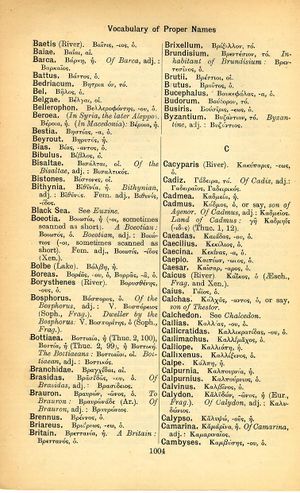Calliope
Σύμβουλος οὐδείς ἐστι βελτίων χρόνου → Consultor homini tempus utilissimus → Kein besserer Berater zeigt sich als die Zeit
English > Greek (Woodhouse)
Καλλιόπη, ἡ.
Latin > English (Lewis & Short)
Callĭŏpē: ēs (Callĭŏpēa, ae, Verg. E. 4, 57; Prop. 1, 2, 28; Ov. F. 5, 80; cf. Prisc. p. 563 P.), f., = Καλλιόπη and Καλλιόπεια (fine-voiced),
I the chief of the Muses, goddess of Epic poetry, and, in the poets, sometimes of every other kind of poetry (e.g. the lyric, Hor. C. 3, 4, 1 sqq.; of amatory poetry, Ov. Tr. 2, 568; of rural poetry, Col. 10, 225; cf. Jahn, Trist. p. 198); the mother of Orpheus by Œagrus, Hyg. Fab. 14; acc. to Serv. ad Verg. A. 5, 864, the mother of the Sirens by Acheloüs; Lucr. 6, 94; cf. Prop. 2, 1, 3; Ov. M. 5, 339; Aus. Idyll. 20, 7; Anthol. Lat. I. p. 73, 9; Mart. 4, 31, 8. To her Hor. C. 3, 4, is addressed.—
II Meton.
A (Per syllepsin.) All the Muses, Verg. A. 9, 525.—
B (Per synecdochen.) Poetry, Ov. Tr. 2, 568.— Hence, Callĭŏpēĭus, a, um, adj., = Καλλιοπήϊος, of Calliope: puer, i. e. Hymenaeus, Anthol. Lat. VI. p. 89, 77: musici, Firm. Math. 7, 25.

